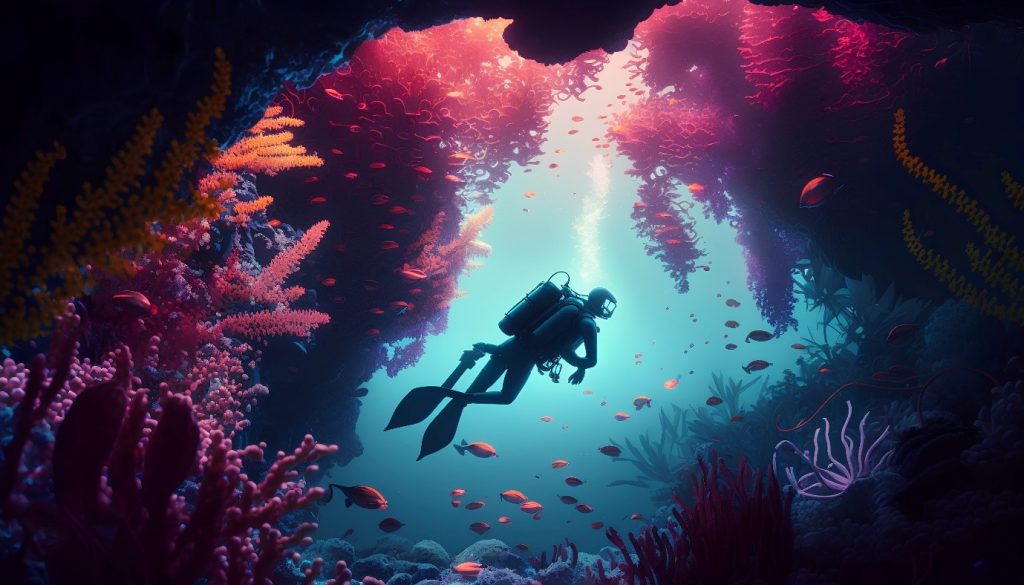Chris Kaminski and Amy C. Marshall are business partners and avid scuba divers. In the following article, Chris and Amy provide insights into the world of scuba diving for beginners, sharing their love and passion for the sea with readers.
Any fan of the deep blue sea experiences the pull that
scuba diving brings — seeing the beautiful underwater landscapes is enough to make anyone’s jaw drop. Despite the excitement, it's a daunting activity to get started with, prompting the need for expert advice for diving in head first (literally).
Chris Kaminski says that from choosing the best beginner spots to learning to clear ears to breathing properly, well-established divers, such as Chris and Amy have divulged all their top tips and tricks, compiled here.
Chris Kaminsky and Amy C. Marshall on Picking the Perfect Beginner Diving Spot
Newbie divers should choose destinations that are within their certification limits and boast easy in-water conditions. To become more comfortable underwater and to practice the various skills needed to excel safely, individuals should head to shore and simple boat diving spots.
Sometimes, Amy C. Marshall notes that such locations can be hard to decipher. Therefore, experts recommend beginners stick to one of the following
best novice destinations:
- Red Sea in Egypt — The best time to go is from May to November. However, the location hosts dives year-round and is ultra-affordable too.
- Koh Tao and Similan Islands in Thailand — With a bunch of easy dive spots, Thailand has warm waters and a stunning array of wildlife to gaze upon.
- Playa del Carmen in Mexico — Shore diving along Playa del Carmen comes highly recommended as a beginner location. The caves are also available to newbies!
6 Top Tips for First-Timers
Chris Kaminski says that with the location picked, first-time scuba divers should consider the advice below very carefully to ensure fun and safe diving experiences.
#1 Pay Attention to the Briefing
Amy C. Marshall explains that divemasters provide a briefing and overview of the conditions, marine life, and the plotted route prior to every dive. And it's important for all divers (but especially beginners) to listen closely.
When it comes to an end, those who're unsure should always speak up and ask questions. Divemasters are professionals who're more than able to clear up concerns before getting in the water.
Extra Expert Tip: Know the basic hand signals. That way, newbies can easily interact with the divemaster and buddy during the diving session.
#2 Clearing Ears Like a Pro
Clearing the ears (otherwise known as equalizing) is the process of releasing pressure from the ears and sinuses as divers head further under the surface. Learning this skill before getting in the water is vital.
Chris Kaminski says that ideally, beginner dives will have descent lines from the boat which can be held to slowly move down feet first while equalizing. As the pressure builds, divers can pinch their nose closed and blow slowly to release/pop the ears before heading further down the line.
#3 Demisting the Mask
Amy C. Marshall says that fogged up masks eradicate fields of vision and eliminate all fun from the diving experience. And while some divers swear by a bit of spit on the mask to prevent fog, that doesn't work for everybody.
Instead, beginners should wash their mask with toothpaste or dish soap and a soft toothbrush or a commercial defogger. This will prevent mask fog, guaranteeing a fun dive.

 #4 Maintaining Buoyancy Control
#4 Maintaining Buoyancy Control
Buoyancy control prevents divers bobbing up and down, helping them stay at their desired depth without constant changes.
Typically, divers with too much air in their BCD will rise; those with too much weight will sink. Divemasters usually help novices calculate the correct weight before going underwater.
Chris Kaminski notes that divers should slowly add a small amount of air into the BCD when they reach their desired depth. At this point, controlling breathing is essential to stay in place. And after a while, small buoyancy changes can be conducted with breath alone.
#5 Breathing Optimally
The less air consumed underwater; the more time divers can stay below the surface. However, newbies often utilize the air much faster than experienced divers due to nerves, buoyancy struggles, and unnecessary movement.
Amy C. Marshall explains that staying calm and breathing slowly and deeply will reduce the amount of air consumed. Beginners who master this technique earlier in their diving endeavors tend to do the best.
#6 Leaving Nothing Behind
Chris Kaminski of Alabama explains that divers shouldn't carry anything that could be deemed trash. But sometimes mistakes are made, and novices who find themselves taking less-than-desirable items under the surface should ensure it isn't swept away by the current.

 #4 Maintaining Buoyancy Control
#4 Maintaining Buoyancy Control